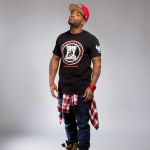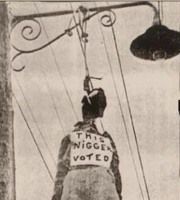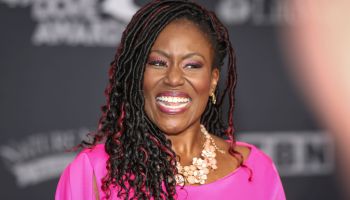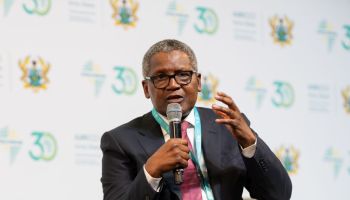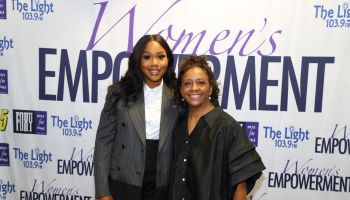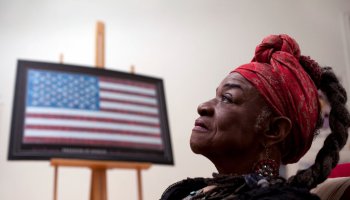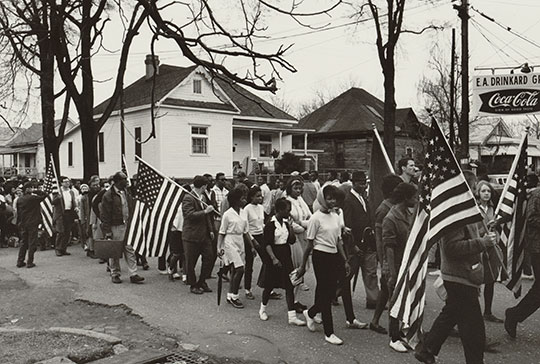
1. Earlier generations fought and died for this right
It took the eventual passage of three constitutional amendments, the 14th, 15th and 24th, before all Black Americans could freely vote in the U.S.
“Black people historically in this country were not allowed to vote for so long,” said Olutimilehin Olusanya, who moved to Minnesota from Georgia in 2008. “I have voted in every election since I’ve been here.”
African Americans weren’t given the right to vote in the U.S. until 1869, but to this day, Black voters still fight against discriminatory practices that hinder their civic right. In 2011, a record number of voting restrictions that disproportionately affected African Americans were introduced in state legislatures nationwide, including photo ID requirements, cuts to early voting and restrictions to voter registration.
2. Blacks are an important voting bloc
After tracking voting patterns in presidential elections from 1936 to 1960, the Joint Center for Political and Economic Studies found Blacks voted Democratic between 60 to 80 percent. But since the 1964 election when Lyndon Johnson got 94 percent of the Black vote, the Democratic Party has received no less than 82 percent of the Black vote.
In 2012, 76 percent of Blacks called themselves Democrats, 16 percent Republican and eight percent other or independent. Obama got over 90 percent of the Black vote in his reelection bid.
As a result, one political party almost expects Blacks automatically to vote for them, while the other party virtually has given up seeking Black votes. This is true in Minnesota as well, where the DFL currently controls both legislative houses and the governor’s office. But some believe both parties need to do more to earn Black votes.
“I know that a lot of our people are discontent with the Republicans and the Democrats,” said Brooklyn Center resident Thomas Berry. “I think one of the things that we’ve done wrong is that we blindly [have] given our votes to folk that don’t respect us or love us, or care for us. We must make either party earn [our] vote.”
“Congress has been pretty much stalemate on the president and won’t allow things to go through,” said KMOJ Radio Station Manager Kelvin Quarles. “Our government is on lockdown.”
Some believe that it’s important for Black voters to keep Republicans out of office.
“I feel that if the Republicans get in there, they probably will display action or lack of action for us [Blacks] as they have in the past,” said KMOJ night personality Caddy “The Prince of Darkness.”
Either way, the Black voting bloc holds a lot of power, but only if Black voters show up to the polls.
3. Ferguson
The police shootings in Ferguson and strained police-community relations in Minneapolis have made this a top election issue for Blacks. If any progress in bringing about more police accountability are to happen, Black voters must use their vote to elect officials who will act.
“We need to start asking some of the candidates key questions about issues that impact our community,” said University of St. Thomas Law Professor Nekima Levy-Pounds. “What are they doing to address issues of police misconduct and brutality right here in the Twin Cities? Those are the types of questions that we need to be asking these candidates, instead of just offering our votes without demanding anything in return.”
4. Everything to gain, and much to lose
Some fear that depending on this election’s final result that disparities in the Black community, such as unemployment, housing, education and health could worsen.
“African Americans should vote because we are the ones that are at the bottom of the pole economically, at every level you can think of,” said Berry.
According to a 2011 Economic Policy Institute study, Minnesota has the highest unemployment disparities between Whites and Blacks in the nation. Unemployment for White workers is about seven percent, while for Black workers it’s 20 percent.
African Americans are also more likely to die from prostate cancer and breast cancer than their White counterparts, according to a 2010 Minnesota Department of Health report, and African American youth have the highest rates of obesity.
If Black voters don’t express their needs to elected officials, their needs most likely won’t be addressed.
“I think our vote is important because it will determine a lot of issues that affect African Americans,” said Quarles.
5. Fighting against embedded apathy
There are Blacks who subscribe to the ‘they don’t feel like their vote counts’ theory and won’t vote in any election, said Kelvin Quarles.
KMOJ program director Candice Breedlove said she was raised to believe voting just wasn’t important.
“I feel that there is some importance to [voting] but I’m not a good person to ask because I don’t vote,” Breedlove said. “I wasn’t raised to think that it was important. As I got older, I was still told that it wasn’t important, and I went with it and never thought about it.”
Breedlove said that she’s been more in touch with news and current events lately, but the only time she ever voted was in 2012.
But going with the narrative that Black votes don’t matter only perpetuates the issue, and some Black voters note that in order to change that, African Americans simply have to vote.
“The only way you can show your power is [to] vote,” said Thomas Berry. “We as African Americans need to vote and show that our vote is just as important.”
Levy-Pounds said it’s imperative that African Americans vote this election cycle in order to challenge long-time incumbents who haven’t benefited the African American community during their time in office.
“I’m tired of people coming and knocking on our doors, and handing out [campaign] literature that benefit zero for the African American community,” Levy-Pounds said. “We need to show them that we take our votes very seriously by showing up. We need to hold our elected officials accountable.”
See the full commentary here: http://www.tcdailyplanet.net/news/2014/09/25/five-reasons-why-african-americans-should-vote-year






